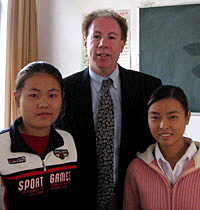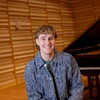|
Dr. Ted Schwalbe (center) with students from Anhui University. |
With a population of 1.3 billion people and with an increased emphasis on higher education for more students, China is looking to send more of its students to study in U.S. universities. Professor Ted Schwalbe, who also serves as chair of SUNY Fredonia’s Department of Communication and coordinator of International Learning, recently attended a conference on higher education in China sponsored by the American Association of State Colleges and Universities (AASCU).
The first part of the conference took place in Beijing in conjunction with the Eighth China International Forum on Education that included a large student expo. “There were literally hundreds of booths of universities promoting themselves to Chinese students. But the vast majority of booths were by European universities. The American universities are way behind in recruiting Chinese students” said Dr. Schwalbe.
A number of panel sessions took place as well. Representatives from Chinese universities, government ministries, and the U.S. State Department all gave attendees information about Chinese higher education. “One fundamental change in the past 15 years is the transition of higher education for the elite to higher education for the masses. In 1992, about 3 percent of college-age students were in college. Now it is 22 percent.”
The second part of the conference took place in the Anhui Province located about 1,200 miles south of Beijing. Fifteen members of the AASCU delegation, including Dr. Schwalbe, visited Huangshan College and Anhui University. They met with provincial government officials, university administrators, faculty and students. “Going into the class room and talking with students was the highlight of the entire trip” said Dr. Schwalbe. “They asked all kinds of interesting questions about American culture, religion, sports, and American universities. But no questions about American foreign policy – this was a topic they would not be allowed to ask about in public.”
Three major impediments for Chinese students studying in the U.S. are cost, language, and visas. “The tuition at the universities we visited ranged from $500 to $800 per year. This is of course much lower than at any U.S. university,” noted Dr. Schwalbe. While many Chinese students study English (passing a competency exam was a requirement at both universities visited by the AASCU group), it can still be difficult to take classes taught by native English speakers. He also noted that obtaining a student visa to study in the U.S. became a major problem for all international students after 9/11, but the U.S. Embassy in Beijing said that the process is getting better. In 2006, there were approximately 63,000 Chinese students in the U.S. – the second largest number of international students after India. Most popular programs of study included sciences, economics, and business.
The number and percentage of Chinese students studying at SUNY Fredonia has increased dramatically in recent years. Of the 53 international students enrolled in 2003, only two were Chinese. For the 2007-2008 academic year, there are 80 international students and 23 of the students are Chinese.




